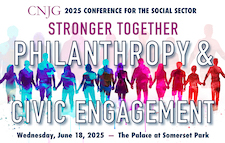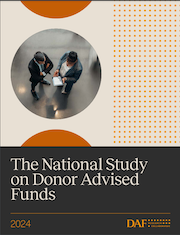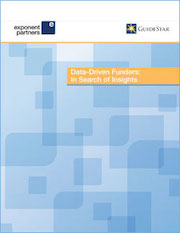Site Search
- resource provided by the Forum Network Knowledgebase.
Search Tip: Search with " " to find exact matches.
CNJG's 2018 Annual Meeting & Holiday Luncheon pre-meeting workshop with Michelle Greanias from PEAK Grantmaking focused on how foundation CEO’s, program officers, staff, and trustees could engage internally to put values-based grantmaking into practice.
Walk the Talk Video

Date: Wednesday, June 18
Time: 8:00 a.m. to 4:00 p.m.
Location
The Palace at Somerset Park
333 Davidson Ave, Somerset, NJ
CNJG’s 2025 Conference for the Social Sector—Stronger Together: Philanthropy and Civic Engagement, features recognized thought leaders, national and regional experts, and community leaders for a full day of connection, shared exploration, thoughtful discussion, and side-by-side learning with philanthropic and nonprofit colleagues.
This year's conference will examine how funders and nonprofits can work together to address and increase civic engagement, focusing on several key areas, including advocacy, local media, participatory budgeting, guaranteed income, public-private partnerships, the arts, and youth education through the lens of civic participation.
Civic engagement is about more than voting or elections. As our colleagues at Philanthropy for Active Civic Engagement (PACE) define it:
“Civic engagement is the process of helping people be active participants in building and strengthening their communities, whether defined as a place or a shared identity or interest. It’s a spectrum of ways people can participate in self-governance, from interactions with government to voluntary associations, and everything in between.”
The opportunity for local communities to convene, learn together, and form partnerships can lead to meaningful action and increased public participation. Let’s explore how philanthropy can impact the social sector by buttressing these connections.
CNJG represents over 130 of NJ’s leading philanthropic organizations – foundations, corporations, and donors. Each year, we present a large-format meeting to include nonprofit partners to discuss big picture topics fostering learning and dialogue between funders and nonprofits.
| Agenda | |
| 8:00 - 9:00 am |
Registration/Breakfast/Networking/Resource Marketplace |
| 9:00 - 10:00 am | |
| 10:00 - 10:15 am |
Networking & Resource Marketplace |
| 10:15 - 11:30 am |
Morning Sessions: The Future of Civic Engagement |
| 11:30 - 11:45 am |
Networking & Resource Marketplace |
| 11:45 - 1:30 pm | |
| 1:30 - 1:45 pm |
Networking & Resource Marketplace |
| 1:45 - 3:00 pm |
Afternoon Sessions: Mobilizing New Jersey |
| 3:00 - 4:00 pm |
Ice Cream Reception/Networking/Resource Marketplace |
Conference Photos
President Obama's Hurricane Sandy Task Force released this rebuilding strategy to serve as a model for communities across the nation facing greater risks from extreme weather and to continue helping the Sandy-affected region rebuild. The Rebuilding Strategy contains 69 policy recommendations, many of which have already been adopted, that will help homeowners stay in and repair their homes, strengthen small businesses and revitalize local economies and ensure entire communities are better able to withstand and recover from future storms.
As a follow-up to our Giving in Indiana study (released earlier this year), Indiana Philanthropy Alliance is pleased to share this snapshot of promising practices for advancing diversity, equity and inclusion in Indiana philanthropy. Throughout our state, foundations are incorporating the values of diversity, equity and inclusion (DEI) into their organizational cultures; engaging diverse populations as staff, board members, donors, and grantees; and working to make their communities more welcoming places. This report is an effort to capture a sampling of these endeavors.
This advocacy and civic engagement toolkit is designed for private foundations that want to educate and encourage their grantees about getting involved in civic and policy activities to increase organizational capacity and impact. While its primary focus is on the grantmaking activity of foundations, the toolkit also addresses rules and guidance for policy involvement by foundation officials acting on behalf of their foundations.
The TD Charitable Foundation, the charitable arm of TD Bank, has announced grants totaling $7.2 million to 36 nonprofits in support of housing affordability and stability.
Awarded through the foundation’s annual Housing for Everyone program, grants of $200,000 each will boost solutions for low- to moderate-income (LMI) homeowners struggling to maintain homeownership. Recipients include Rebuilding Together Miami-Dade (Florida), Midcoast Habitat for Humanity (Rockport, Maine), Valley Community Development Corp. (Northampton, Massachusetts), Family Promise of Warren County (Phillipsburg, New Jersey), Cypress Hills Local Development Corporation (Brooklyn, New York), and Greenville Housing Fund (Greenville, South Carolina).
“Amid rising housing costs, these organizations play a vital role in supporting homeowners in communities across TD’s footprint to afford critical repairs, avoid foreclosure, correct tangled titles, and so much more,” said TD Charitable Foundation director Paige Carlson-Heim. “The efforts of the Housing for Everyone grantees are so appreciated, as their work is essential to protecting homeowners and providing long-term stability in our neighborhoods. By supporting these nonprofits, we hope to help mitigate the threat of home loss while ensuring homeowners have the resources and resilience they need to sustain long-term homeownership.”
FirstEnergy Corp. announced today that the FirstEnergy Foundation has distributed more than $2 million in the first two quarters of 2025 to support local nonprofits. Organizations were selected based on their ongoing efforts to meet the critical needs of our customers in communities served by the company's electric companies and in areas where the company conducts business.
The FirstEnergy Foundation granted nearly $1.1 million to support a range of community needs, including hunger relief, youth education and disaster relief efforts. Additionally, the employee-driven United Way Campaign generated more than $1 million with strong support from company leadership. More than 800 organizations received direct donations, and 104 United Way agencies benefited from the company's matching contributions.
Beyond providing grants to local nonprofits, the FirstEnergy Foundation encourages employees to give back to their local communities and provides support in helping employees make a larger impact. FirstEnergy provides each of its employees with 16 hours of volunteer time off (VTO) annually, allowing team members to donate their time and talents to 501(c)3 nonprofit organizations. So far this year, FirstEnergy employees have donated nearly 5,000 volunteer hours to brighten communities across the company's footprint.

This project represents the most extensive independent study on DAFs to date.
Thanks to the collective efforts of 111 DAF programs that voluntarily provided anonymized data to the research team, the dataset covers nine years of activity from more than 50,000 accounts, with over 600,000 inbound contributions to DAFS and more than 2.25 million outbound grants from DAFs.
The DAFRC research team hopes this data will be used to improve best practices, inform relevant regulation, or enhance the field’s use of DAFs as a philanthropic tool for donors, DAF sponsoring organizations, and other sector partners.

As part of its Spring Grants Cycle, JWF will be supporting the following programs in 2022-23: Planned Parenthood of Metropolitan New Jersey for Teen LINKS and School Sexual Health Education, which will provide intensive training to high school girls in sexual education, peer advocacy and digital impact; The Safe House affiliated with Clara Maass Medical Center for The Safe House Kitchen Renovation, which will allow for necessary upgrades at a shelter that provides temporary housing for women and children; SHE Wins Inc. for the #SELF Program, which will assist high school girls in the Newark area to develop their social emotional learning, leadership, and college and career readiness skills.
oday New Jersey Community Capital, a leading national community development financial institution, committed $50,000 to nonprofits chosen by mayors and a county leader who are deeply committed to furthering formative economic impact efforts in their respective communities. Each leader will have $10,000 to award to a local nonprofit doing groundbreaking work. NJCC awards the grants at the close of Black History Month annually to mark the commemoration's focus on creating economic equity for divested populations.
This year, NJCC's grants will go to nonprofits chosen by the mayors of Dallas, Texas, New York City, New York and Newark and New Brunswick, New Jersey, and the economic opportunity director of Los Angeles County. Supporting nonprofits in urban communities throughout the nation is in keeping with NJCC's goal to foster sustainable economic development and wealth creation in overlooked communities from coast to coast.
"These grants achieve several of our objectives," NJCC President and CEO Bernel Hall said. "First, it champions the principles behind Black History Month and underscores NJCC's dedication to creating social and economic parity. By contributing to initiatives important to the leaders of these municipalities, we are supporting their efforts to create thriving, equitable communities.
"Our second objective is to support projects that can benefit from our unique, expansive initiatives. We've been extremely effective because our programs are both entrepreneurial and augmentative," explained Hall. This is especially relevant today given our nation's dire need for more affordable housing, small business expansion and high-quality school systems."
This publication from Grantmakers for Effective Organizations offers a framework for thinking about how to measure progress and results in place-based and community change initiatives.

